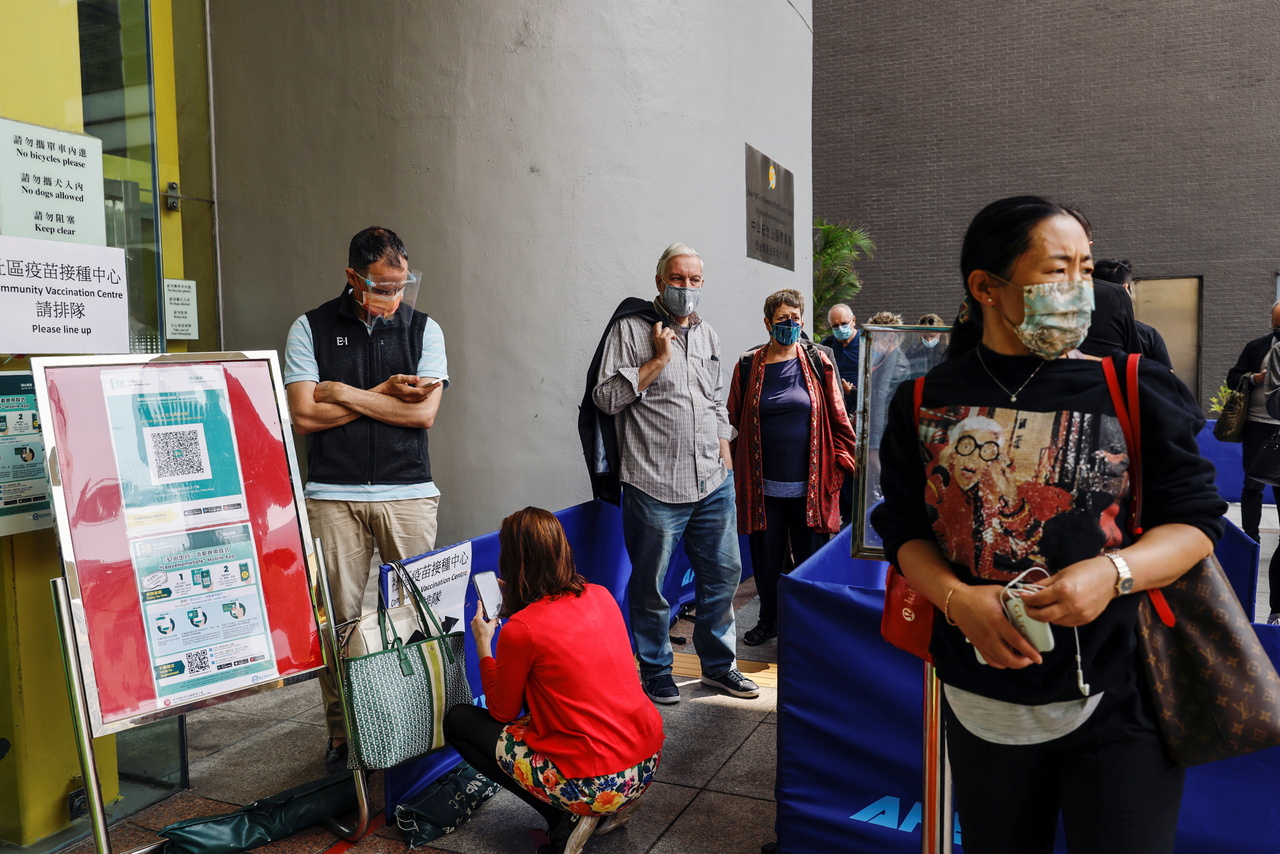News analysis
Hong Kong residents' Covid-19 vaccine hesitancy slowing down city's odds of full reopening by year-end
Sign up now: Get insights on Asia's fast-moving developments

Officials have struggled to get people to go for the free and voluntary jabs.
PHOTO: REUTERS
Follow topic:
HONG KONG - Hong Kong health experts are not hopeful that 70 per cent of the city's population will be inoculated before September, or that borders will fully reopen by the end of the year.
This is despite having ample supply of Covid-19 vaccines.
Inoculation inertia, triggered by a healthy dose of vaccine scepticism and lack of trust in the government, is likely to get amplified as the city's pandemic situation stabilises and remains under control.
Epidemiologist Ben Cowling, a professor at the University of Hong Kong, says "there is quite a high level of vaccine hesitancy" in the territory.
A key factor is the public's fragile confidence in vaccine safety, not helped by reports of adverse events and deaths after the jabs.
Data released on May 8 showed that adverse events, including migraine, chest pain and facial paralysis were reported in 0.16 per cent or about 2,400 cases of the 1.5 million doses of vaccines administered. In all, 16 deaths within 14 days of vaccination were reported, that is 0.001 per cent fatalities for all doses given.
The expert committee tasked to look into this concluded that four cases had no causal relationship with the vaccination, and the rest were preliminarily considered not associated with the jabs.
Beauty parlour owner Candy Wong - who is in her 50s - is firm about not getting the jabs despite the low rate of adverse events and deaths.
"I prefer to wait it out. Maybe the vaccine will be safer later," she said.
Dr Leung Chi Chiu of the Hong Kong Medical Association thinks low confidence in vaccine safety has to do with the government's failure to put things in context.
"This should be specifically addressed with emerging safety data from widespread use in many countries, on top of a weekly update of whether there is any unusual safety signal in Hong Kong," he said.
The respiratory medicine specialist said the government had initially rightly taken "a very cautious approach in December 2020 when data was scanty".
Unfortunately, it did not fine-tune the approach when it rolled out the inoculation drive at end-February, when more data was available, he said.
"The failure to highlight the background rate of common diseases such as myocardial infarction and stroke, and to categorically state the absence of unusual safety signal in handling the first few cases, set the scene to breed various misconceptions, especially among our elderly," Dr Leung added.
Based on government data compiled by Bloomberg, as at May 6, a mere 3.4 per cent of people over the age of 80 have had their jabs, even though they are considered the most vulnerable and have a higher risk of dying from the disease.
Prof Cowling doubts that Hong Kong is heading for herd immunity given the use of two different vaccines.
He focuses on another positive - and probable - outcome: "If at least the most vulnerable are immunised, then we should be able to mitigate the impact of any future outbreaks."
Since the vaccination drive kicked off on Feb 26, officials have struggled to get people to go for the free and voluntary jabs - with residents getting to choose between Germany's Pfizer-BioNTech or China's Sinovac shots.
Based on government data, about 1.8 million doses of the vaccines have been given out.
About 1.1 million individuals, or 13 per cent of the 7.5 million population of Hong Kong, have received their first dose, while about 700,000 have received their second dose.
Dr Leung noted that currently, the daily number of people who receive the first dose of the vaccine hovers around 15,000 - a rate that will not cover 70 per cent of the population before September.
And it looks unlikely that Hong Kong can reopen borders by the end of this year, although it is possible that fully vaccinated people will be able to travel with reduced quarantines, said Prof Cowling.
Chief Executive Carrie Lam on Tuesday (May 11) said the seven-day moving average of confirmed cases per day is less than one, while the figure for untraceable cases is 0.1.
"The only one untraceable case unfortunately has broken the record of over 14-day zero untraceable cases," she added.
Compared with other global cities, Hong Kong has till now recorded a relatively low number of confirmed Covid-19 cases, at about 11,800. It has reported 210 deaths.
To motivate people to sign up for the shots, officials eased social distancing restrictions at various establishments including bars, pubs, restaurants, karaoke lounges and nightclubs for those vaccinated.
Still, that has yet to translate to sustained increase in daily bookings for vaccination appointments, which have slumped from the highs of 145,000 in mid-March to 12,000 on Monday (May 10).
Local media has recently reported that officials are now trying to rope in celebrities and influencers to entice more people to get the jabs.
But Dr Leung believes that "unless we can effectively correct the various misconceptions over the safety of the vaccine, the incentives so far offered are unlikely to reduce vaccination hesitancy among the mass of the population".

